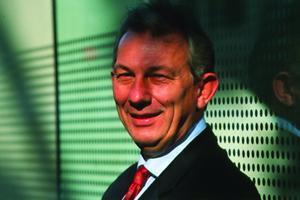In association with Durapipe
As Phil Nedin wryly points out, designers of healthcare are also stakeholders. “You view it not only as a designer, you view it inevitably as a user. One day you could end up in there.”
This is an interesting slant for any designer, but as leader of Arup’s global healthcare executive Nedin is also in the prime position of knowing just what challenges the sector faces. “What we’re finding is that we are coming across unchartered waters in the healthcare environment and there is vast room for learning, understanding and innovation. Tackling the spread of infection using engineering expertise in the hospital environment is high on our agenda.” Arup is currently funding a researcher at Leeds University to investigate the spread of airborne infection in multi bed wards.
Innovation is also a key area. While other sectors happily adopt new ideas healthcare design, by its very nature, is much more prescriptive. “Healthcare is an extremely emotive subject, you can’t put something into a healthcare environment that hasn’t been tried before. We need to to communicate any risks to the users and express the advantages and disadvantages of different systems that are perhaps evidence-based in other business sectors.”
PFI adds to the challenge. “PFI is a very risky business and you’ve got to ask yourself is an innovative approach at odds with this risk. But I think in order to get the best results for healthcare in the UK we’ve got to find a way around it. Again it’s about educating the client and reviewing and refreshing the prescriptive documents to allow innovation, and then validating the design in areas of innovation.”
Nedin’s remit at Arup covers shared responsibility for its Cardiff and Belfast offices as well as heading up the practice’s healthcare division. Until three years ago this was managed by geographical regions but Nedin has been responsible for moulding this into a global unit.
In the UK this was initially driven by PFI but a global reach provides a bigger information base from which to design and innovate. “My role is harvesting that information and pushing it to wherever it is required. I’ve been responsible for developing the business and skills networks to make this possible and really creating an environment where information is shared.”
Nedin’s route into consulting hasn’t been typical. At 15 he left school to take up an apprenticeship as a pipe and ductwork fabricator working in the petrochemical industries and dockyards of South Wales. But in 1974 things changed. “I got made redundant, but at the time I was playing drums in a rock and roll band and the guys in the band decided to move to London so I followed my dream. I was 21 and got a job as a fitter, playing in my spare time.”
Despite gigs in Holland and Germany the ‘big break’ was elusive, and for Nedin it was time to reconsider his future. “I was a site fitter for Hopkinsons Valves at the time and this is where I got really turned on to building services. I wanted to get involved in the design side so I went to college for a couple of evenings a week as a mature student.”
A job at the London Borough of Lambeth gave him the chance to enrol on a day release course at what was then South Bank Polytechnic. Continuing with the course Nedin gained experience at one of the regional health authorities followed by time at a single disciplinary private practice. “ I was 32, I finished my degree and decided to move back to South Wales where I started working for Arup.”
For someone who has taken the mature student route Nedin says one of his passions is to see young people develop and having joined Arup he started lecturing at Cardiff University. “I wanted to put something back into the industry and I’ve gained a lot of satisfaction from doing it over the last 15 years.”
Along with training and education the status commanded by engineers is another area where Nedin believes changes should occur. “Given that mep in buildings accounts for 25%-50% of the total project value, we need to command a position in the team where we can be heard. I think that is changing, particularly in healthcare where clients see that engineering is one of the key areas of innovation.”
Being a rounded consulting engineer though isn’t just about design skills and six years ago Nedin undertook an Open University post graduate diploma in management. “I felt I needed an injection of knowledge because I was entering unchartered territory. Nobody would want an unqualified engineer working on projects but we tend to take for granted the management knowledge we need to look after people and deal with finance.”
The future? Nedin intends to forge ahead leading Arup’s healthcare team and find real answers to the global issue of infection control. A tall task maybe, but one he believes he can find the remedy for.
Source
Building Sustainable Design























No comments yet